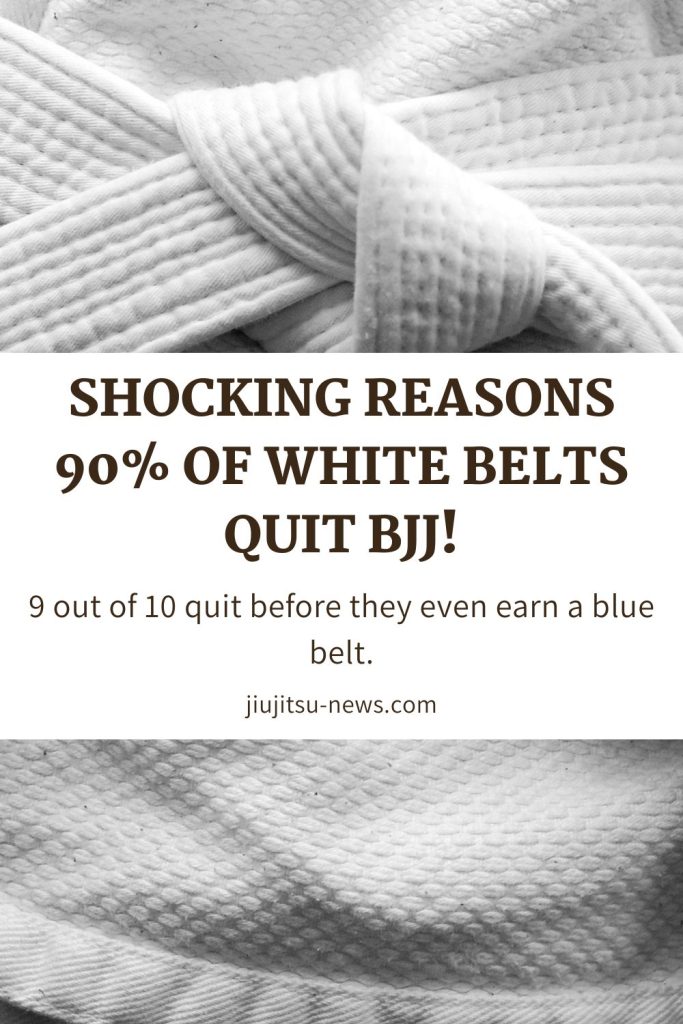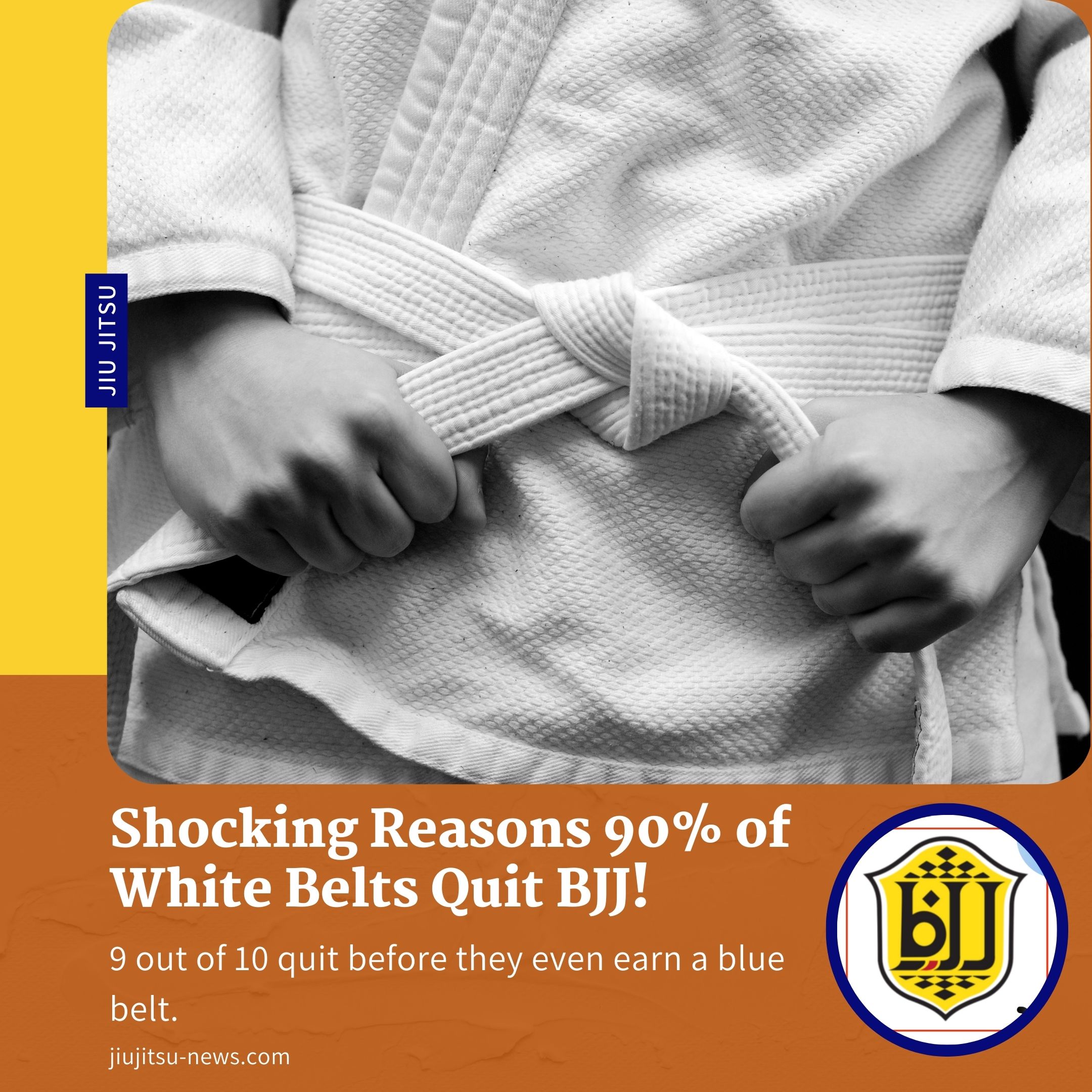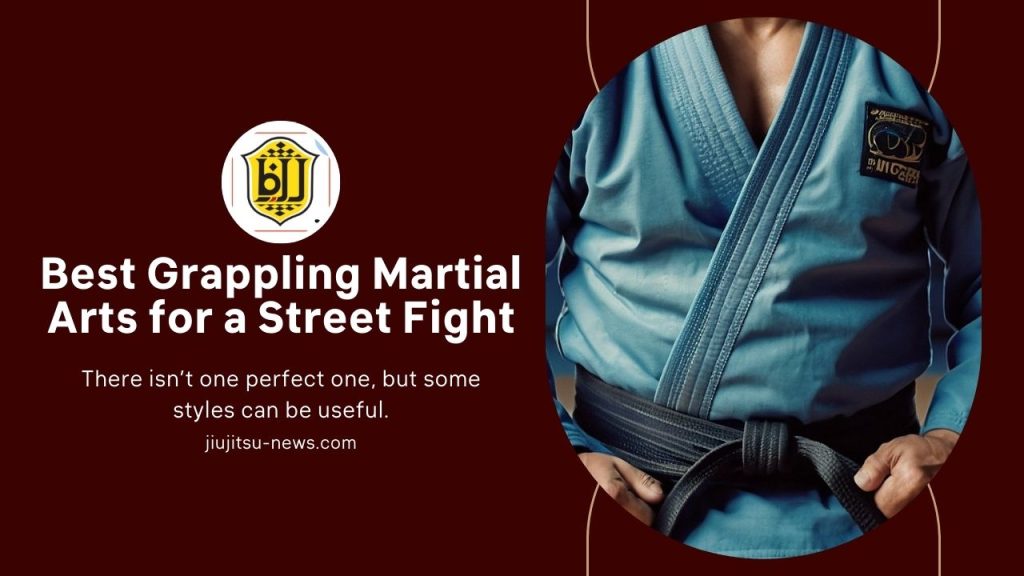Starting Brazilian jiu-jitsu is exciting, but almost 90% of white belts quit BJJ. They get their gi, show up, and learn how to shrimp across the mat. It feels like they’re stepping into something big and exciting.
But most BJJ white belts don’t make it. Yep. 9 out of 10 quit before they even earn a blue belt.
That doesn’t mean they don’t love Brazilian jiu-jitsu. Many still watch matches and talk about them with friends. But something happens—on or off the mats—that makes them walk away.
Let’s talk about why that is. And if you’re just starting out, maybe this will help you stick with it.
Why Do 90% of White Belts Quit BJJ?

1. Training Feels Way Too Intense
Some gyms go hard—like way too hard—for beginners.
You show up thinking you’ll learn some cool moves. Instead, you’re rolling with someone twice your size who’s been training for years. You leave class feeling crushed… or worse, injured.
You should be learning the basics — how to move, how to breathe, and how to stay safe. But if you get thrown into tough sparring right away, it’s easy to feel like you don’t belong.
And occasionally? It’s dangerous. A real case involved a white belt who suffered serious injuries and became paralyzed due to a drill gone wrong. The gym faced a lawsuit worth $46 million. No joke. This stuff matters.
2. Injuries Scare People Away
Injuries happen in BJJ. These injuries can include sore necks, tweaked elbows, and bruised egos.
But here’s the tricky part: It’s not just the injury. It’s the fear of coming back.
You heal, but your mind’s still stuck. You fell behind. You’re terrified of experiencing another setback. You start making excuses. You disappear without any warning.
The truth? Everyone trains with some kind of injury or setback. The key is pacing yourself. You don’t need to excel immediately. Ease in. Give your body and brain time to catch up.
3. The Comparison Trap
Comparing yourself with other advanced BJJ practitioners can be frustrating. You show up, and someone’s hitting slick armbars or flying triangles. Meanwhile, you’re just trying to survive closed guard without falling over.
At first, it’s inspiring. Then, it becomes overwhelming. You start thinking, “Why am I struggling at this?” or “I’ll never be like them.”
And that thought? It’s overwhelming. It makes you feel small. It gives you the impression that your progress is unimportant. But guess what? Everyone started where you are. Even the black belts once looked lost in their first month.
4. No Clear Path = Confused and Frustrated
Some gyms have a solid curriculum. Others? It’s as if you’re given ten random moves and asked to figure it out.
Without structure, it’s simple to become disoriented. You’re doing techniques without knowing why they matter or when to use them. This lack of understanding affects your confidence.
What is one effective strategy? Start a training journal. Write down what you learn. Even if it’s just a few lines. It gives you something to look back on. Progress becomes visible. Small wins matter.
5. BJJ Is Expensive
Let’s be real. Jiu-jitsu is not cheap.
- Gym fees can hit $100–$300 a month.
- Gi? Another $100.
- Mouthguard, rashguard, spats… It adds up fast.
For many, that’s just too much. Life gets in the way. Budgets get tight. And when you miss a few weeks, it gets harder to come back.
There’s no magic solution here. If your budget is tight, consider looking for budget gyms, purchasing second-hand gear, or training less often but focusing more during each session.
6. Life Gets Busy
Work. Kids. Bills. Life.
Training three or four times a week doesn’t sound crazy — until you’re juggling everything else. Time becomes a formidable adversary. BJJ finds itself neglected.
But there’s a way around this. Look at your week and ask, “When can I train that doesn’t mess up everything else?”
It might be early mornings. Alternatively, it could involve a single, uninterrupted weekend class. It doesn’t have to be perfect. It just has to be something.
7. Burnout Is Real
You go all in at first. Train every day. Watch YouTube every night. Think about BJJ all day at work. Then it hits you. Your body hurts. Your brain’s fried. You’re exhausted.
That’s burnout. And it makes quitting feel like the only option. But you don’t have to quit. You just need to slow down. Two classes a week is fine. Three is great. Only add more if you truly feel the need.
Jiu-jitsu is a lengthy game. No one wins by sprinting through it.
Final Thought
BJJ is hard. At white belt, it can feel frustrating, painful, and downright confusing. However, that’s not a reason to quit. It’s a sign that you’re right where you’re supposed to be.
The people who stick with it? They’re not the most talented. They’re not the strongest. They’re just the ones who kept showing up.
So keep going. Continue even if you miss a week or feel stuck.
What should I read next? You’re not alone. That’s why I created this library — every article, story, and guide I’ve written, all in one place. Keep it rolling!



